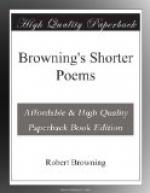“The just man in his purpose strong, No madding crowd can turn to wrong. The forceful tyrant’s brow and word . . . . . . . His firm-set spirit cannot move.”
There is novelty of conception in giving the situation from the tyrant’s point of view. Compare also the seventh Ode of Horace in Book II.
44. =gravamen=. Latin for burden, difficulty, annoyance.
69. =Just= (as) =my vengeance= (was) =complete=.
What conception do you get of the tyrant? What is his motive? What things aggravate his hatred? How does he seek to “extinguish the man”? What baffles him at first? What defeats him finally? Is he deterred by physical or moral fear? By what means is the poem given vigor and clearness? Note the dramatic effect in the last stanza.
THE PATRIOT. (PAGE 85.)
At what point in his career does the speaker give his story? What have been his motives? How was he at first treated? What indicates that the change is not in him, but in the fickle mob? How does he view his downfall? In what thought lies his sense of triumph? How does his greatness of soul appear?
THE BOY AND THE ANGEL. (PAGE 87.)
24. ="the voice of my delight"=. That is, the boy’s simple praises.
What quality did the praise of the Pope and of the angel lack? What is the meaning of the legend?
MEMORABILIA. (PAGE 91.)
In Browning’s early youth, while he was under the influence of Byron and Pope, he found, at a bookstall, a stray copy of Shelley’s Daemon of the World. From this time on, Shelley’s poetry was his ideal. The term “moulted feather” has peculiar significance from the fact that this was a poem which Shelley afterwards rejected.
How is childlike wonder expressed in the first two stanzas? How is the difference between the speaker and his friend indicated? Why does the name of Shelley mean so much more to one than to the other? In the figure that follows, what do the moor and the eagle’s feather stand for?
WHY I AM A LIBERAL. (PAGE 92.)
Note the essential elements of sonnet structure in metre, rhyme, and number of lines. See the Introduction to Sharp’s Sonnets of this Century. Compare the idea of the poem with that of The Lost Leader.
PROSPICE. (PAGE 93.)
Written shortly after the death of Mrs. Browning.
Note the vividness of the imagery, the swiftness of the movement, the rise to the climax, the change in spirit after the climax, and the note of courage and hope that informs this poem. Compare it with Tennyson’s Crossing the Bar. What difference in spirit between the two?




